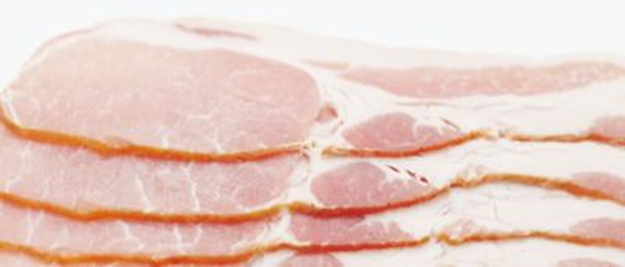Astonishing amounts of salt in bacon exposed
Campaigners say “enough is enough” as survey reveals two rashers of bacon can contain as much salt as eight packets of crisps

A new survey by campaign group Action on Salt this January has revealed “astonishing” levels of salt in bacon. It may not come as surprise to hear that bacon is salty, but the survey revealed two shocking truths. Firstly, just how incredibly salty it is: almost all products (86%) have a salt concentration equal to or greater than seawater. Secondly, the amount of variation between products: some products contain four times the amount of salt of others. Action on Salt argue that this demonstrates a lack of commitment from the food industry to lower the amount of salt they add to food, doing nothing to improve the nation’s health.
Out of 171 products surveyed, available from all major UK retailers, every single product bar one would get a red traffic light for salt. Two rashers of bacon can contain up to 2.84g of salt, but the recommended daily maximum is 6g. So, one bacon sandwich, with bread and sauces, could easily take you well on the way to the daily maximum.
The worst offender was Tesco Finest Unsmoked 8 Wiltshire Cure Back Bacon Medallions which contains 5.3g/100g, more than twice the concentration of seawater, and the equivalent salt content of one Burger King Hamburger in just one rasher. The least salty option was The Co-operative 8 Reduced Fat Unsmoked Bacon Medallions with 1.45g/100g of salt, four times less that the saltiest offender.
This staggering variation in salt content demonstrates that there’s no need for the saltier products to be so salty. There has been a lack of progress from manufacturers in cutting the amount of salt in bacon, with many failing to meet the Government targets set in 2012 for the maximum amount of salt permitted in bacon products. A recent report by Public Health England found the average salt content of bacon is 3.14g/100g, significantly higher than the target of 2.88g/100g.
Some products have even got worse. Of the products surveyed that are directly comparable to those in a similar survey carried out in 2012, two thirds have stayed the same or got saltier. Action on Salt have called the lack of progress pathetic, and are calling on Government to reignite a salt reduction programme with compulsory targets for the amount of salt that can be added to food, rather than the current voluntary targets, and strict penalties for those who don’t meet them.
Bacon is the second biggest contributor of salt to the UK diet, so reducing the amount of salt in bacon could have an important impact on how much salt people eat and therefore their blood pressure. Salt is the leading cause of high blood pressure, and high blood pressure is a leading cause of stroke and heart disease. Reducing salt intake on a national scale could prevent thousands of unnecessary deaths every year.
Sonia Pombo, Campaign Manager for Action on Salt, says: “Given the fact that bacon is the biggest contributor to salt after bread in the UK diet, and that we are still far exceeding our daily salt targets, it’s shocking to learn that food manufacturers are still ignoring the voluntary salt reduction targets and putting profits before the health of the nation. We have seen great success with the soft drinks industry levy in driving reformulation, and the government must now consider doing the same for key contributors of salt in UK diet, such as bacon. This way, everyone’s health benefits, including the socially deprived.”
Graham MacGregor, Professor of Cardiovascular Medicine at Queen Mary University of London, and Chair of Action on Salt and Blood Pressure UK, states: "Whilst Boris Johnson has pledged to spend millions of pounds on building new hospitals – many of which will treat the many thousands of people suffering or dying from strokes and heart disease, the Prime Minister must be reminded that just one-gram reduction in population salt intake prevents more than 4,000 premature deaths per year in the UK and costs next to nothing to implement.
“For many years, food manufacturers have been allowed to put profits before the health of our nation and we now urgently need Boris Johnson’s no nonsense approach to get things done with an 'oven ready’ mandatory salt reduction programme for all products for 2020. This will save thousands of people suffering and dying unnecessarily, and at the same time provide huge cost savings to the NHS."
How to make healthier choices when it comes to your bacon sandwich
- Check the label and use the FoodSwitch appto find healthier options.
- Be mindful of portion sizes. Some manufacturers declare unrealistic portion sizes (e.g. one rasher).
- Try to avoid eating bacon with other salty ingredients such as bread, cheese and baked beans, and instead have grilled tomato, grilled mushrooms, no added salt baked beans or eggs.
- Bacon can also be high in fat, so grill your rashers to reduce the amount of fat.
- For healthier bacon (and gammon), soak them in water and rinse in hot water to remove some of the salt, and remove the rind to reduce saturated fat.
- If you want to have ketchup, mustard or brown sauce with your bacon, check the labels first, or use Action on Salt’s free app FoodSwitch, and choose the lower salt options as these can be another source of hidden salt.
- Alternatives to pork tend to be lower in saturated fat and salt, e.g. turkey rashers, or plant based options, but they still contain added salt.
- When eating out, ask for ‘less salt please’ and tell the waiter if you find your meal too salty.
Read more on the survey from Action on Salt.
